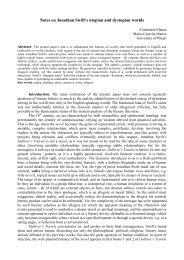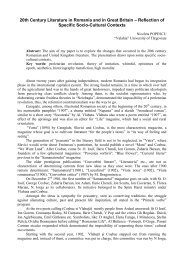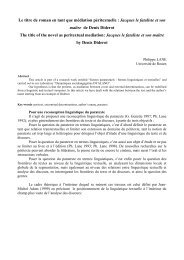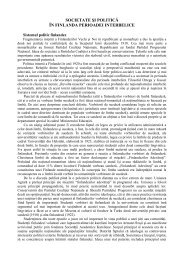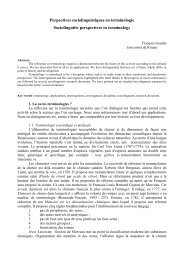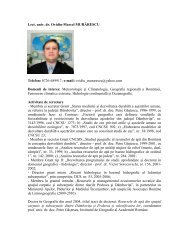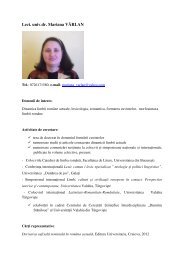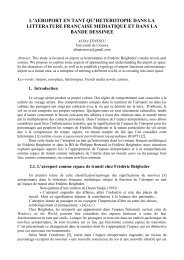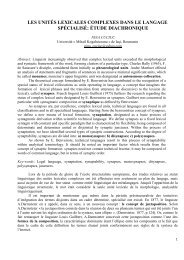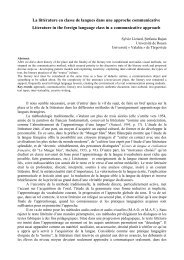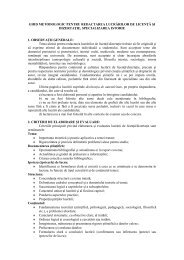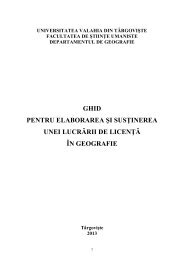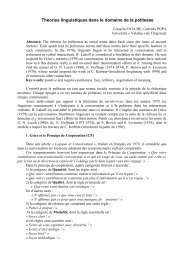THE ANNALS OF „VALAHIA” UNIVERSITY OF TÂRGOVIŞTE
THE ANNALS OF „VALAHIA” UNIVERSITY OF TÂRGOVIŞTE
THE ANNALS OF „VALAHIA” UNIVERSITY OF TÂRGOVIŞTE
Create successful ePaper yourself
Turn your PDF publications into a flip-book with our unique Google optimized e-Paper software.
42<br />
Discourse and ideology<br />
The Annals of „Valahia” University of Târgovişte<br />
In an attempt to trace the history of the concept of 'ideology' and how it is<br />
used, out of an 'incapacity' to define what it 'really' means which, according to<br />
Terry Eagleton is not due to the 'low intelligence' of workers in the field, but to 'its<br />
whole range of useful meanings, not all of which are compatible with each other'<br />
(Eagleton, 1991: 1), Richardson informs that it 'was originally coined by Antoine<br />
Destutt de Tracey in the years after the French Revolution to refer to 'a new science<br />
of ideas, an idea-logy, which would be the ground of all other sciences' (McLellan,<br />
1986, cited in Richardson 2007: 32). Eagleton also considers tracing the term<br />
through histories a better option than trying to 'theorize' it: “The word 'ideology',<br />
one might say, is a text, woven of a whole tissue of different conceptual strands; it<br />
is traced through by divergent histories, and it is probably more important to assess<br />
what is valuable or can be discarded in each of these lineages than to merge them<br />
forcibly into some Grand Global Theory.” (1991: 1). He does, however, draw a list<br />
of definitions for the word, not only to show that some of them are incompatible<br />
with one another, but also that the lines of thought they bear upon are different, in<br />
that some of them follow the epistemological tradition, while others follow the<br />
sociological one. For the same reason Eagleton enumerates the definitions, 'to<br />
indicate the variety of meanings', we shall render his list as well:<br />
“(a) the process of production of meanings, signs and values in social life;<br />
(b) a body of ideas characteristic of a particular social group or class;<br />
(c) ideas which help to legitimate a dominant political power;<br />
(d) false ideas which help to legitimate a dominant political power;<br />
(e) systematically distorted communication;<br />
(f) that which offers a position for a subject;<br />
(g) forms of thought motivated by social interests;<br />
(h) identity thinking;<br />
(i) socially necessary illusion;<br />
(j) the conjuncture of discourse and power;<br />
(k) the medium in which conscious social actors make sense of their world;<br />
(l) action-oriented sets of beliefs;<br />
(m) the confusion of linguistic and phenomenal reality;<br />
(n) semiotic closure;<br />
(o) the indispensable medium in which individuals live out their relations to<br />
a social structure;<br />
(p) the process whereby social life is converted to a natural reality 3 ”<br />
3 I will cite here Eagleton's endnote to the list of definition: “For a useful summary of the various<br />
meanings of ideology, see A. Naess et al., Democracy, Ideology and Objectivity, Oslo 1956, pp.<br />
143 ff. See also Norman Birnbaum, 'The Sociological Study of Ideology 1940-1960', Current<br />
Sociology, vol. 9, 1960, for a survey of theories of ideology from Marx to the modern day and an<br />
excellent bibliography.”




